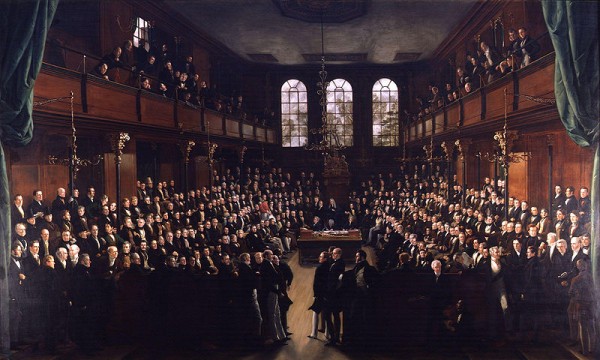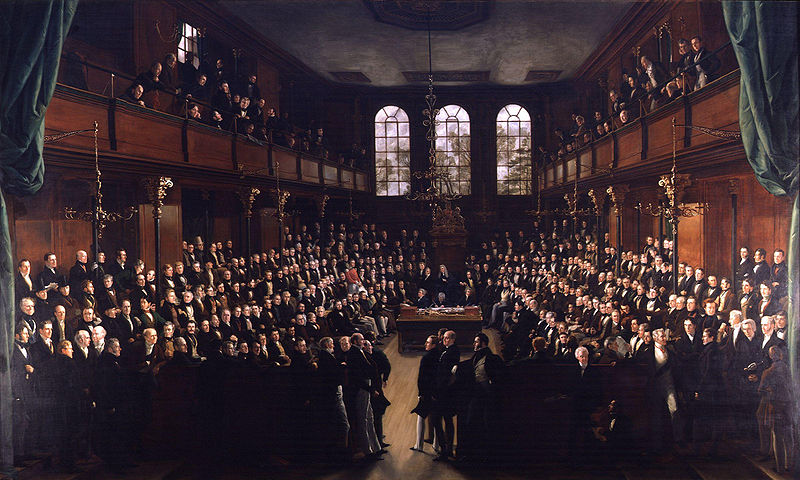 Data shows us that Rhode Island has one of the least polarized legislatures in the country. It is governed by a centrist consensus that fails to please policy demanders on the wings. Yet those demands from the wings are essential to maintaining the consensus – politicians can portray themselves as fighting against so-called “special interests” from whichever side is useful.
Data shows us that Rhode Island has one of the least polarized legislatures in the country. It is governed by a centrist consensus that fails to please policy demanders on the wings. Yet those demands from the wings are essential to maintaining the consensus – politicians can portray themselves as fighting against so-called “special interests” from whichever side is useful.
The sudden ascent of Speaker Nicholas Mattiello shows us how dominant the Rhode Island consensus is; a Democratic speaker was elected with the majority support of the Republican caucus. Within the Democratic caucus, the opposition (equivalent to 16% of the vote) was equally split between the alternative candidate and abstention. Some of Mattiello’s erstwhile opponents even turned their coats and voted for him when it was apparent they could not win. Defeated opponent Rep. Blazejewski described the decision by saying that “…egos shouldn’t get in the way. We have to elect a new leadership team and move forward with all of the problems facing our state.”
And yet, despite saying his rise was a “sea change” in how the House was to be governed and calling for unity, Mattiello’s ascension fit previous patterns – a majority leader takes the speakership. Those who oppose him are cast into the wilderness, those who support him are rewarded with the spoils of victory. Perhaps that those sharing the spoils were marked with Rs as well as Ds was not so typical, but it’s been done before.
This is the consensus that governs Rhode Island politics and creates a government that swerves from right to left on fanciful whims. This is a consensus that either co-opts or isolates those who would oppose it. This is the consensus that creates a de facto one-party system and cripples Rhode Island’s government from taking more than a piecemeal and ineffective approach to change. Thus a “Rhode Map” is issued that addresses an imaginary problem rather than the real one, tax cuts are passed without an honest plan for how they’ll increase economic activity – or how the State will leverage their issuance, and minor electoral tweaks made that will fail to make a real impact on building a flourishing participatory democracy.
Somewhere along the way, I’ve read that a democracy with a single-party system isn’t really a democracy. While I leave it to others to debate whether Rhode Island is more oligarchy than democracy, I think the problem lies in the lack of an organized and disciplined opposition. Right now, Rhode Island’s government is similar to Britain’s in the early 19th century, dominated by factions who rapidly change allegiances based on their interests. Until a real opposition is constructed, I do not foresee much in the way of real change happening in Rhode Island.
The old, unsuccessful way to build an opposition has been to construct an alternate party. Robert Healey’s Cool Moose Party in the 90s has vanished and the Green Party and the Libertarian Party are unsuccessful in getting anywhere. Ken Block’s Moderate Party proved that with enough cash the media will listen, but the project of building a centrist party when the Republican Party already occupies a centrist position was really nothing more than a re-branding of the Republicans that proved to be a spoiler in the 2010 elections. Block has since succumbed to the reality that the Republican brand is still the better one than the Moderate brand.
And they are brands, symbols to differentiate one political organization from the other. The party organizations themselves are extraordinarily weak in Rhode Island. Does anyone truly believe that it matters very much whether a Bill Lynch, Ed Pacheco, or David Caprio “runs” the Democratic Party? Even less can be said for the impact of Ken McKays, Mark Zaccarias, or Mark Smileys on the direction of the Republican Party. Success in Rhode Island’s political environment depends on associating yourself with the Democratic brand, and these days it seems even House Republicans understand that.
The current state of Rhode Island’s political system has given rise to a network of organizations that generally support the candidates of the Democratic Party; a national brand that is extremely popular within the state. In place of the old machine method of politics, politicians must now build a coalition from the organizations within the network, gain support of activists, and successfully win voters. It is a significant boon to start with the popularity of the Democratic brand.
The old way of organizing an opposition was to start without the benefit brand. That’s like shooting yourself in the foot when you set out to win a marathon. A real opposition must take a page out of the past and form a “Loyal Opposition”. Just as there is a Democratic government, there must be a Democratic opposition to this government. This isn’t about egos, this is about solving our state’s problems by providing a genuine alternative from a genuine opposition.
That opposition must also come from the left. The Moderate project supposed an opposition could be built in the center, while ignoring that both Democrats and Republicans already occupy that space. From the broad support the Democratic Party enjoys, we know that its values are supported. The current consensus pays, at best, lip service to those values. There is simply more room for opposition at the Democratic left.
I’m not alone in realizing this. What Rhode Island needs is an independent political organization that will organize and rally an opposition – endorsing and supporting candidates in primaries and the general election. It fits in with current trends within the Left. It fits in with historical trends. The Working Families Party is using this strategy with a not inconsiderable amount of success.
This is a project which is the building of a substitute political party. It’s not a small order, it’s not a short-term thing, and it’s not a goal for the weak-willed. But for Rhode Island’s democracy and Democrats (both small d and big D) to flourish, it must be done.

